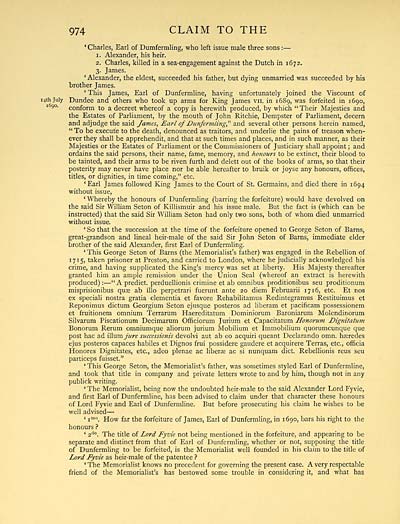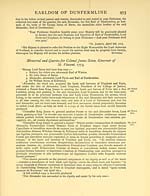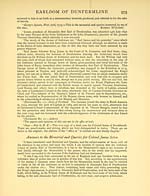Download files
Complete book:
Individual page:
Thumbnail gallery: Grid view | List view

974 CLAIM TO THE
' Charles, Earl of Dumfermling, who left issue male three sons : —
i. Alexander, his heir.
2. Charles, killed in a sea-engagement against the Dutch in 1672.
3. James.
'Alexander, the eldest, succeeded his father, but dying unmarried was succeeded by his
brother James.
' This James, Earl of Dunfermline, having unfortunately joined the Viscount of
14th July Dundee and others who took up arms for King James vn. in 1689, was forfeited in 1690,
1 S 0- conform to a decreet whereof a copy is herewith produced, by which " Their Majesties and
the Estates of Parliament, by the mouth of John Ritchie, Dempster of Parliament, decern
and adjudge the said James, Earl of Dunfermling," and several other persons herein named,
" To be execute to the death, denounced as traitors, and underlie the pains of treason when-
ever they shall be apprehendit, and that at such times and places, and in such manner, as their
Majesties or the Estates of Parliament or the Commissioners of Justiciary shall appoint ; and
ordains the said persons, their name, fame, memory, and honours to be extinct, their blood to
be tainted, and their arms to be riven furth and delett out of the books of arms, so that their
posterity may never have place nor be able hereafter to bruik or joyse any honours, offices,
titles, or dignities, in time coming," etc.
'Earl James followed King James to the Court of St. Germains, and died there in 1694
without issue,
'Whereby the honours of Dunfermling (barring the forfeiture) would have devolved on
the said Sir William Seton of Killismuir and his issue male. But the fact is (which can be
instructed) that the said Sir William Seton had only two sons, both of whom died unmarried
without issue.
'So that the succession at the time of the forfeiture opened to George Seton of Barns,
great-grandson and lineal heir-male of the said Sir John Seton of Barns, immediate elder
brother of the said Alexander, first Earl of Dunfermling.
' This George Seton of Barns (the Memorialist's father) was engaged in the Rebellion of
1715, taken prisoner at Preston, and carried to London, where he judicially acknowledged his
crime, and having supplicated the King's mercy was set at liberty. His Majesty thereafter
granted him an ample remission under the Union Seal (whereof an extract is herewith
produced): — "A predict, perduellionis crimine et ab omnibus proditionibus seu proditionum
misprisionibus quae ab illo perpetrari fuerunt ante 20 diem Februarii 17 16, etc. Et nos
ex speciali nostra gratia dementia et favore Rehabilitamus Redintegramus Restituimus et
Reponimus dictum Georgium Seton ejusque posteros ad liberam et pacificam possessionem
et fruitionem omnium Terrarum Haereditatum Dominiorum Baroniarum Molendinorum
Silvarum Piscationum Decimarum Officiorum Jurium et Capacitatum Honorum Dignitatem
Bonorum Rerum omniumque aliorum jurium Mobilium et Immobilium quorumcunque que
post hac ad ilium jure successionis devolvi aut ab eo acquiri queant Declarando omn. hasredes
ejus posteros capaces habiles et Dignos frui possidere gaudere et acquirere Terras, etc., officia
Honores Dignitatis, etc., adeo plenae ac libera? ac si nunquam diet. Rebellionis reus seu
particeps fuisset."
' This George Seton, the Memorialist's father, was sometimes styled Earl of Dunfermline,
and took that title in company and private letters wrote to and by him, though not in any
publick writing.
' The Memorialist, being now the undoubted heir-male to the said Alexander Lord Fyvie,
and first Earl of Dunfermline, has been advised to claim under that character these honours
of Lord Fyvie and Earl of Dunfermline. But before prosecuting his claim he wishes to be
well advised —
' i mo . How far the forfeiture of James, Earl of Dunfermling, in 1690, bars his right to the
honours ?
' 2 d0 . The title of Lord Fyvie not being mentioned in the forfeiture, and appearing to be
separate and distinct from that of Earl of Dunfermling, whether or not, supposing the title
of Dunfermling to be forfeited, is the Memorialist well founded in his claim to the title of
Lord Fyvie as heir-male of the patentee ?
' The Memorialist knows no precedent for governing the present case. A very respectable
friend of the Memorialist's has bestowed some trouble in considering it, and what has
' Charles, Earl of Dumfermling, who left issue male three sons : —
i. Alexander, his heir.
2. Charles, killed in a sea-engagement against the Dutch in 1672.
3. James.
'Alexander, the eldest, succeeded his father, but dying unmarried was succeeded by his
brother James.
' This James, Earl of Dunfermline, having unfortunately joined the Viscount of
14th July Dundee and others who took up arms for King James vn. in 1689, was forfeited in 1690,
1 S 0- conform to a decreet whereof a copy is herewith produced, by which " Their Majesties and
the Estates of Parliament, by the mouth of John Ritchie, Dempster of Parliament, decern
and adjudge the said James, Earl of Dunfermling," and several other persons herein named,
" To be execute to the death, denounced as traitors, and underlie the pains of treason when-
ever they shall be apprehendit, and that at such times and places, and in such manner, as their
Majesties or the Estates of Parliament or the Commissioners of Justiciary shall appoint ; and
ordains the said persons, their name, fame, memory, and honours to be extinct, their blood to
be tainted, and their arms to be riven furth and delett out of the books of arms, so that their
posterity may never have place nor be able hereafter to bruik or joyse any honours, offices,
titles, or dignities, in time coming," etc.
'Earl James followed King James to the Court of St. Germains, and died there in 1694
without issue,
'Whereby the honours of Dunfermling (barring the forfeiture) would have devolved on
the said Sir William Seton of Killismuir and his issue male. But the fact is (which can be
instructed) that the said Sir William Seton had only two sons, both of whom died unmarried
without issue.
'So that the succession at the time of the forfeiture opened to George Seton of Barns,
great-grandson and lineal heir-male of the said Sir John Seton of Barns, immediate elder
brother of the said Alexander, first Earl of Dunfermling.
' This George Seton of Barns (the Memorialist's father) was engaged in the Rebellion of
1715, taken prisoner at Preston, and carried to London, where he judicially acknowledged his
crime, and having supplicated the King's mercy was set at liberty. His Majesty thereafter
granted him an ample remission under the Union Seal (whereof an extract is herewith
produced): — "A predict, perduellionis crimine et ab omnibus proditionibus seu proditionum
misprisionibus quae ab illo perpetrari fuerunt ante 20 diem Februarii 17 16, etc. Et nos
ex speciali nostra gratia dementia et favore Rehabilitamus Redintegramus Restituimus et
Reponimus dictum Georgium Seton ejusque posteros ad liberam et pacificam possessionem
et fruitionem omnium Terrarum Haereditatum Dominiorum Baroniarum Molendinorum
Silvarum Piscationum Decimarum Officiorum Jurium et Capacitatum Honorum Dignitatem
Bonorum Rerum omniumque aliorum jurium Mobilium et Immobilium quorumcunque que
post hac ad ilium jure successionis devolvi aut ab eo acquiri queant Declarando omn. hasredes
ejus posteros capaces habiles et Dignos frui possidere gaudere et acquirere Terras, etc., officia
Honores Dignitatis, etc., adeo plenae ac libera? ac si nunquam diet. Rebellionis reus seu
particeps fuisset."
' This George Seton, the Memorialist's father, was sometimes styled Earl of Dunfermline,
and took that title in company and private letters wrote to and by him, though not in any
publick writing.
' The Memorialist, being now the undoubted heir-male to the said Alexander Lord Fyvie,
and first Earl of Dunfermline, has been advised to claim under that character these honours
of Lord Fyvie and Earl of Dunfermline. But before prosecuting his claim he wishes to be
well advised —
' i mo . How far the forfeiture of James, Earl of Dunfermling, in 1690, bars his right to the
honours ?
' 2 d0 . The title of Lord Fyvie not being mentioned in the forfeiture, and appearing to be
separate and distinct from that of Earl of Dunfermling, whether or not, supposing the title
of Dunfermling to be forfeited, is the Memorialist well founded in his claim to the title of
Lord Fyvie as heir-male of the patentee ?
' The Memorialist knows no precedent for governing the present case. A very respectable
friend of the Memorialist's has bestowed some trouble in considering it, and what has
Set display mode to:
![]() Universal Viewer |
Universal Viewer | ![]() Mirador |
Large image | Transcription
Mirador |
Large image | Transcription
Images and transcriptions on this page, including medium image downloads, may be used under the Creative Commons Attribution 4.0 International Licence unless otherwise stated. ![]()
| Histories of Scottish families > History of the family of Seton during eight centuries > Volume 2 > (434) |
|---|
| Permanent URL | https://digital.nls.uk/96852030 |
|---|
| Attribution and copyright: |
|
|---|---|
| Description | A selection of almost 400 printed items relating to the history of Scottish families, mostly dating from the 19th and early 20th centuries. Includes memoirs, genealogies and clan histories, with a few produced by emigrant families. The earliest family history goes back to AD 916. |
|---|

